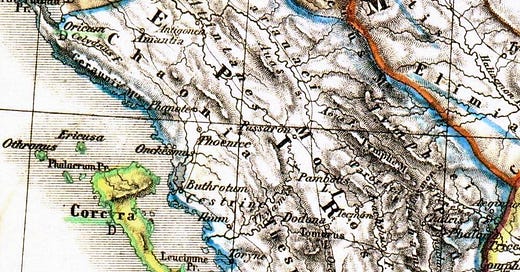Anchises is still alive until the very end of this book, and Aeneas always defers to him, and calls him “father Anchises.” In this book, we see the appropriate deference to the pater familias.
I’m posting these pieces as I go, so I don’t really know the details of the Aeneid. It will be interesting to see what I get wrong, or misinterpret.
Some of the archaeological evidence shows that Roman legion soldiers and / or their auxiliaries learned to read and write Latin using the Aeneid, which will be part of my Roman WIP. That’s why I’m reading it. I first read the Latin aloud (mispronounced, I know), looking at the literal translation directly below it. Then I research whatever doesn’t make sense to me. Then I read an English translation (currently using the one by Robert Fitzgerald).
Most of my research for this book was figuring out where Aeneas headed from Troy. First he went northeast to Thrace, where he uncovered the body of Polydorus, a son of King Priam who was killed by Polymestor, King of the Bistonian Thracians, who switched sides to Agamemnon when the Trojans started losing. Aeneas gives him a proper burial, and Polymestor is shown as an example of treachery to allies.
Then he headed south and stopped at the island of Delos, where Anius, a friend of his father Anchises, is the king. They make sacrifices and get prophecy, which Anchises incorrectly interprets to mean they’re meant to settle on Crete.
They head to Crete, where they start to settle, plowing fields and starting families, until they are hit by a plague. They determine the gods actually meant for them to go to Ausonia, a location in Italy (where Rome will be one day).
They head west and land on the Strophades islands (west of the main Greek island Kalamata), where they run into the harpies, who keep stealing the meat from their feast / offering. Finally, Aeneas tells his men to fight them. They run the harpies off, but Celaeno, the chief harpy, prophesies that they’ll know famine because they wouldn’t let the harpies eat their feast.
They sail around to the other side of Kalamata, and then land at Epirus, where they run into Andromache, mourning at the grave? Memorial mound? Of her husband Hector. Although after Hector’s death, she was the concubine of the son of Achilles, she is now married to Helenus, the full brother of Hector, and they are king and queen of Greek Epirus. Helenus is a seer, and tells Aeneas how to get around Celaeno’s prophecy of famine. Andromache gives Aeneas’s son Ascanius a cloak she has woven herself, and Aeneas himself is gifted with the armor of Achilles. They are told to head for Ausonia / Italy by going all the way around Sicily to the west, instead of going between Sicily and Italy.
[I left out a lot about Andromache, because I’m going to do a separate essay on her. Her situation is especially interesting, given the situation of the first century Roman soldiers themselves, and their families, who are using this text to learn to read and write Latin.]
They’re not exactly able to do that, because they end up on the island of Cyclops, where they pick up one of the men abandoned by Ulysses. So I guess there was one survivor of the Odyssey other than Ulysses. Aeneas really doesn’t make either Ulysses or Achilles look very good.
They end up at the western Sicilian port of Depranum, where Anchises dies. Based on the previous books of the Aeneid, they spent some time in Sicily, which Aeneas skips over here. Then Aeneas wraps up his story to Dido, with the storm that brought them to Carthage.





Nice bit of details. The Aeneid is a classic that I'm hoping to get into at some point. After all, I named the hero of my first novel Aeneas. Also, Dante is someone who was near and dear to my heart, and he held Virgil is such a high regard.